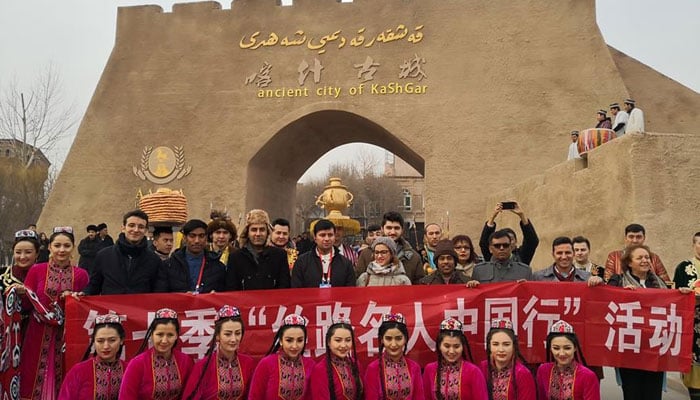Foreign scholars, media professionals discover ‘modern, open’ Xinjiang
One scholar from Türkiye commended the development of the border city, and the international opportunities it provides
XINJIANG: A delegation comprising scholars and media professionals from eight countries in the Middle East and other parts of Asia concluded their five-day tour of northwest China’s Xinjiang Uygur Autonomous Region on Thursday, with delegation members saying the region’s modernity, openness and inclusivity have left a deep impression on them.
Beginning their journey in Urumqi, the regional capital of Xinjiang, the delegation explored local museums and urban planning centers, gaining in-depth understanding of the region’s rich historical and cultural heritages as well as its modern urban development. Through visiting local communities and traditional bazaars, they also experienced the diverse culture in Xinjiang and the vibrant life style of local people.
“I was a little bit afraid of visiting Xinjiang given that news that we read outside from China. But coming here and seeing that the place here is very secure, it’s not less developed and secure than other parts of China. I think it’s the very key correction I had from the first few days of being here in Xinjiang,” said Najla Al Zarooni, a senior researcher with the TRENDS Research and Advisory, an independent research institution in the United Arab Emirates.
Visiting the Xinjiang branch of Guangzhou Automobile Group Motor Corporation, the delegates said they were impressed by company’s new energy vehicle technology and its modernized facilities.
“I didn’t expect that this part of China being this developed. This is a very good sign. Technologies and industries are not concentrated only in some parts of China. It seems that in provinces, like Xinjiang, there are more facilities for the young generation to be absorbed in this kind of industry,” said Alireza Khoda Gholipour, deputy director of the Asian Study Office at Iran’s Ministry of Foreign Affairs.
The delegation then headed to the Ili Kazakh Autonomous Prefecture in the region and toured Khorgos, a bustling border city neighboring Kazakhstan.
They witnessed significant Chinese investment in border infrastructure, a key driver of local economic growth.
One scholar from Türkiye commended the development of the border city, and the international opportunities it provides.
“I saw this Khorgos while we were coming here, it looks like a very new and modern place. In Xinjiang, the manufacturing is also increasing quite rapidly.
I see that the Silk Road is reborn, the increase of free trade between countries on the Silk Road will increase prosperity worldwide,” said Mehmet Ugur Ekinci, researcher with the Foundation for Political, Economic and Social Research in Türkiye.
-
 Annular Solar Eclipse 2026: Where And How To Watch ‘ring Of Fire’
Annular Solar Eclipse 2026: Where And How To Watch ‘ring Of Fire’ -
 Zayn Malik Explains Past Comments About Not Being In Love With Gigi Hadid
Zayn Malik Explains Past Comments About Not Being In Love With Gigi Hadid -
 Internet Reacts To 10 Days Flight Ban Over El Paso
Internet Reacts To 10 Days Flight Ban Over El Paso -
 YouTube Music Tests AI-powered ‘Your Week’ Recap To Summarise Listening Habits
YouTube Music Tests AI-powered ‘Your Week’ Recap To Summarise Listening Habits -
 Kelly Clarkson Ready To Date After Talk Show Exit?
Kelly Clarkson Ready To Date After Talk Show Exit? -
 Is AI Heading Into Dangerous Territory? Experts Warn Of Alarming New Trends
Is AI Heading Into Dangerous Territory? Experts Warn Of Alarming New Trends -
 Google Updates Search Tools To Simplify Removal Of Non-consensual Explicit Images
Google Updates Search Tools To Simplify Removal Of Non-consensual Explicit Images -
 Chilling Details Emerge On Jeffrey Epstein’s Parties: Satanic Rights Were Held & People Died In Rough Intimacy
Chilling Details Emerge On Jeffrey Epstein’s Parties: Satanic Rights Were Held & People Died In Rough Intimacy -
 50 Cent Gets Standing Ovation From Eminem In New 'award Video'
50 Cent Gets Standing Ovation From Eminem In New 'award Video' -
 Bad Bunny Delivers Sharp Message To Authorities In Super Bowl Halftime Show
Bad Bunny Delivers Sharp Message To Authorities In Super Bowl Halftime Show -
 Prince William 'worst Nightmare' Becomes Reality
Prince William 'worst Nightmare' Becomes Reality -
 Thai School Shooting: Gunman Opened Fire At School In Southern Thailand Holding Teachers, Students Hostage
Thai School Shooting: Gunman Opened Fire At School In Southern Thailand Holding Teachers, Students Hostage -
 Maxwell Could Get 'shot In The Back Of The Head' If Released: US Congressman
Maxwell Could Get 'shot In The Back Of The Head' If Released: US Congressman -
 Britain's Chief Prosecutor Breaks Silence After King Charles Vows To Answer All Andrew Questions
Britain's Chief Prosecutor Breaks Silence After King Charles Vows To Answer All Andrew Questions -
 New EU Strategy Aims To Curb Threat Of Malicious Drones
New EU Strategy Aims To Curb Threat Of Malicious Drones -
 Halle Berry On How 3 Previous Marriages Shaped Van Hunt Romance
Halle Berry On How 3 Previous Marriages Shaped Van Hunt Romance




